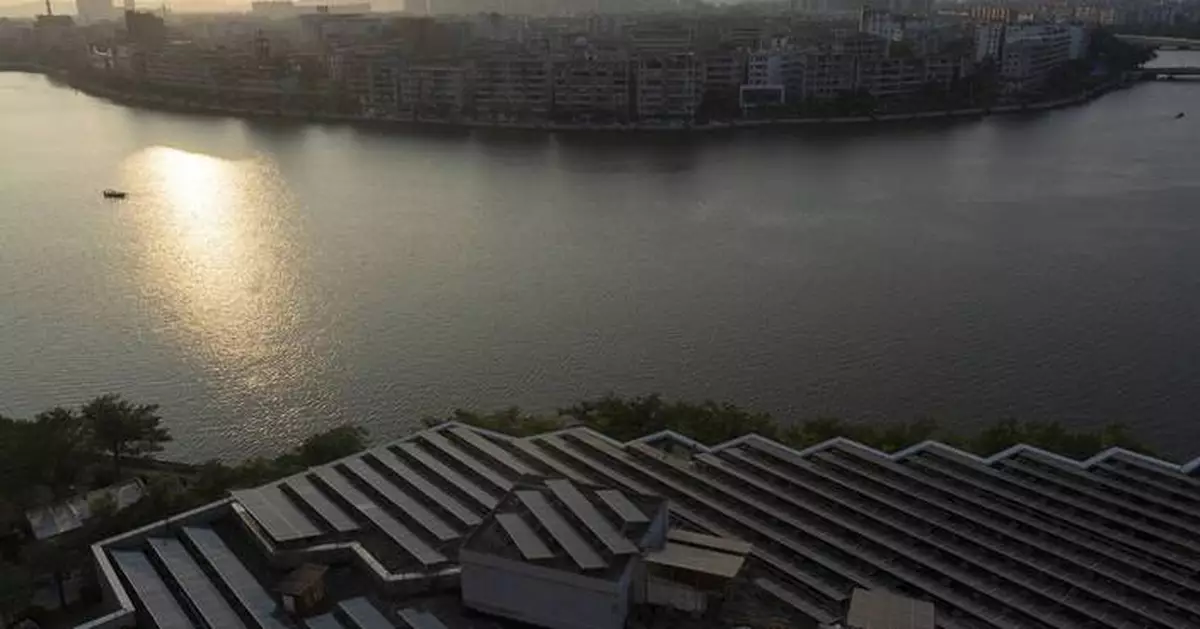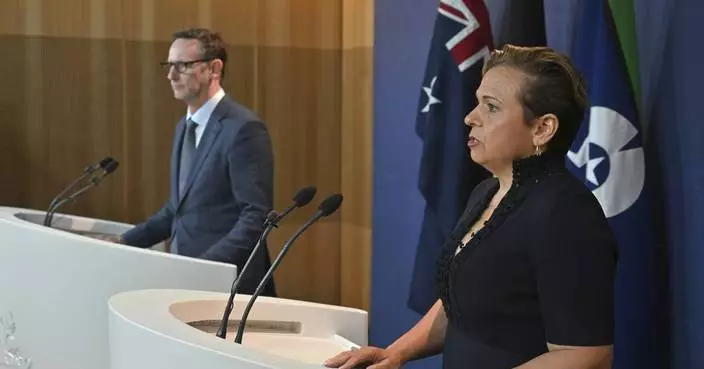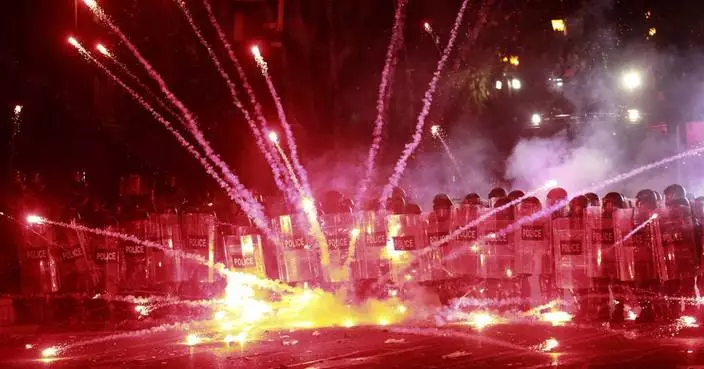BANGKOK (AP) — The Biden administration plans to raise tariffs on solar wafers, polysilicon and some tungsten products from China to protect U.S. clean energy businesses.
The notice from the U.S. Trade Representative’s office said tariffs on Chinese-made solar wafers and polysilicon will rise to 50% from 25% and duties on certain tungsten products will increase from zero to 25%, effective on Jan. 1, following a review of Chinese trade practices under Section 301 of the 1974 Trade Act.
The decision followed a public comment period after the USTR said in September that it was considering such actions.
“The tariff increases announced today will further blunt the harmful policies and practices by the People’s Republic of China," USTR Katharine Tai said in a statement. "These actions will complement the domestic investments made under the Biden-Harris Administration to promote a clean energy economy, while increasing the resilience of critical supply chains.”
Reports Thursday said U.S. and Chinese officials were meeting this week and next for trade talks ahead of the year's end.
Last week, Washington tightened restrictions on Chinese access to advanced semiconductor technology. Beijing responded by banning exports to the U.S. of certain critical minerals needed to make computer chips, such as gallium, germanium and antimony. It also stepped up its controls on graphite exports to the U.S.
China provides a very large share of most of those materials and the United States has been working to secure alternative sources in Africa and other parts of the world.
Tungsten is another strategically vital metal whose production is dominated by China. The U.S. does not produce it, but South Korea is a potential big supplier. It's used to make armaments and is also used in x-ray tubes and light bulb filaments, among other industrial applications. U.S. imports of the metal from China fell to $10.9 million in 2023 from $19.5 million the year before.
After Beijing announced its ban on exporting gallium and the other materials to the United States, analysts said tungsten was another likely area where China might strike back.
Trade frictions have been escalating ahead of the inauguration of President-elect Donald Trump, who has vowed to impose 60% tariffs on Chinese goods, among other threats. President Joe Biden has said Trump’s promise of broad tariffs on foreign imports would be a mistake.
His administration has kept in place tariffs that Trump imposed during his first term in office, but says it has a more targeted approach.
China has sharply ramped up production of cheap electric vehicles, solar panels, and batteries at a time when the Biden administration has championed moves to support those industries in the U.S.
The U.S. and other trading partners say China improperly subsidizes exports, giving exporters of solar panels and other products an unfair advantage in overseas markets, where its manufacturers charge lower prices thanks to government support. Washington also says China improperly pressures foreign companies to hand over technology.
China accounts for more than 80% of the market for solar panels at all stages of production, according to the International Energy Agency, more than double domestic demand for those products. Its huge economies of scale have made solar power more affordable, but also concentrated the supply chain inside China. The IEA has urged other countries to assess their solar panel supply chains and develop strategies to address any risks.
In early 2018, the Trump administration imposed 30% tariffs on imports of Chinese solar panels. Beijing filed a complaint with the World Trade Organization charging that the U.S. was unfairly supporting electric vehicle purchases.
The investigation that led the USTR to raise the tariffs on solar panels concluded with a report in May that has prompted increases in tariffs on a range of products including electric vehicles, syringes and needles, medical gloves and facemasks, semiconductors and steel and aluminum products, among others.
It has pushed tariffs on Chinese-made electric vehicles up to 100% from 25%, raised tariffs on Chinese-made lithium batteries to 25% from 7.5%.
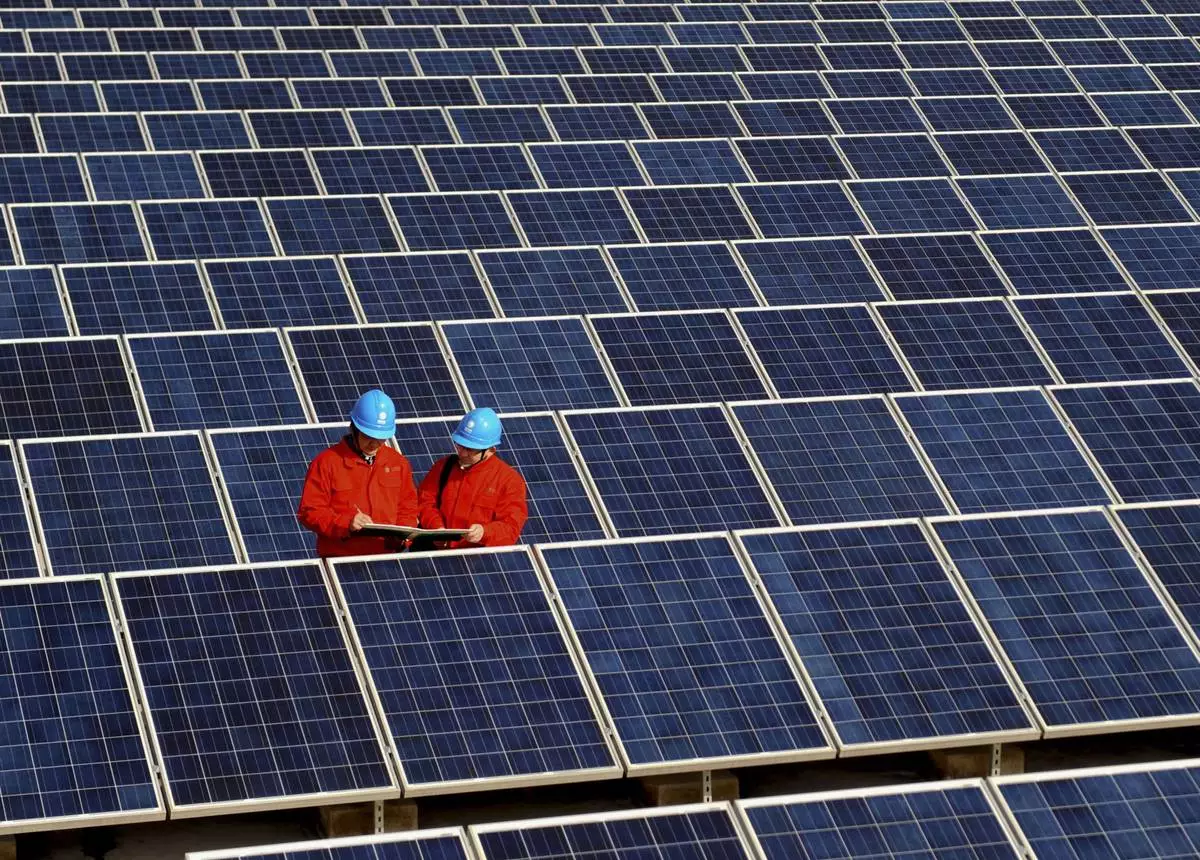
FILE - Workers check solar panels at a solar power station on a factory roof in Changxing, eastern China's Zhejiang province on Feb. 7, 2012. (AP Photo/File)
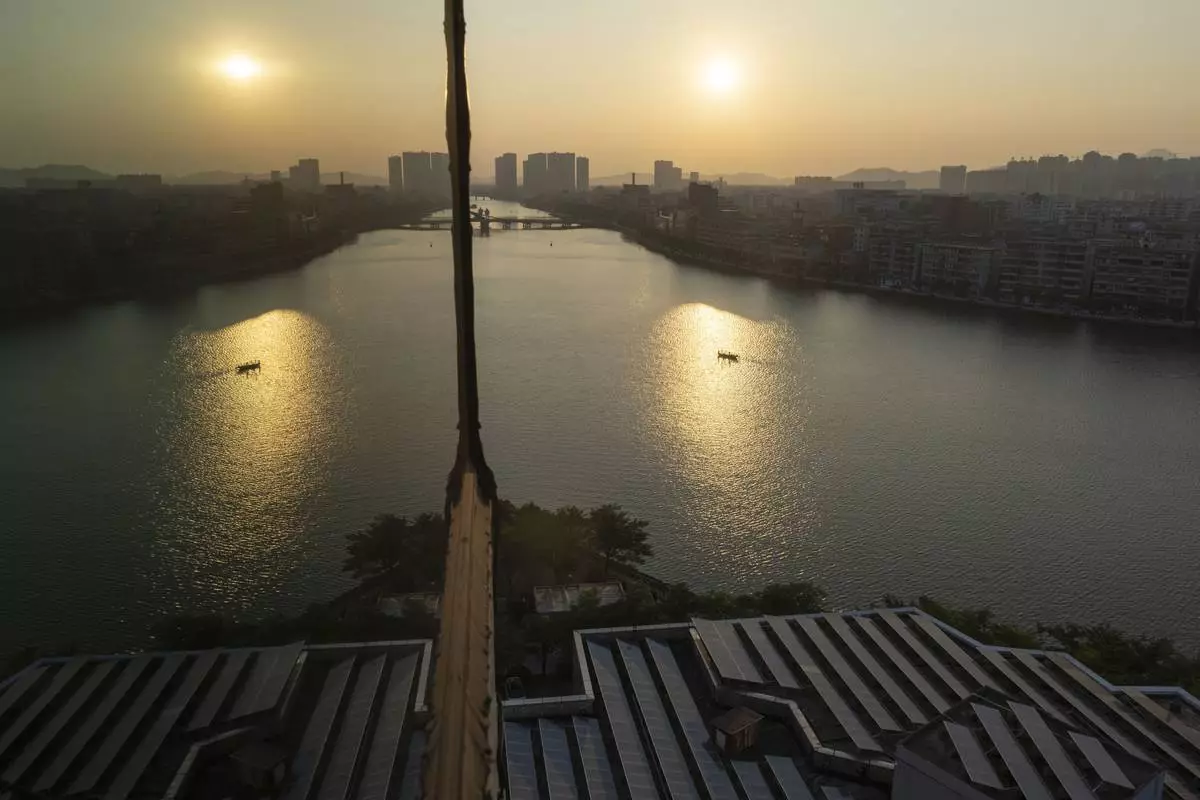
Solar panels on a roof are seen near the sunrise over Jiangmen in southern China's Guangdong province on Friday, Oct. 11, 2024. (AP Photo/Ng Han Guan)
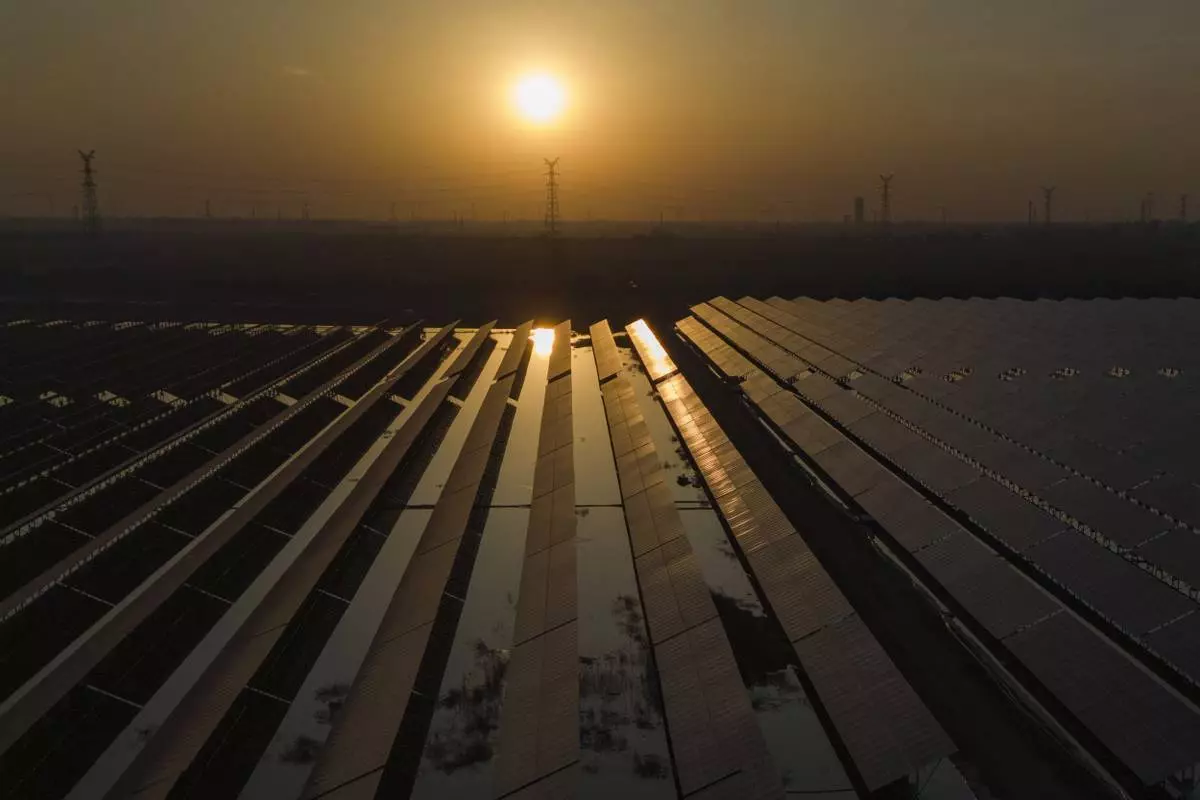
The sun sets over electric pylons along a solar farm near Weifang in eastern China's Shandong province on March 22, 2024. (AP Photo/Ng Han Guan)
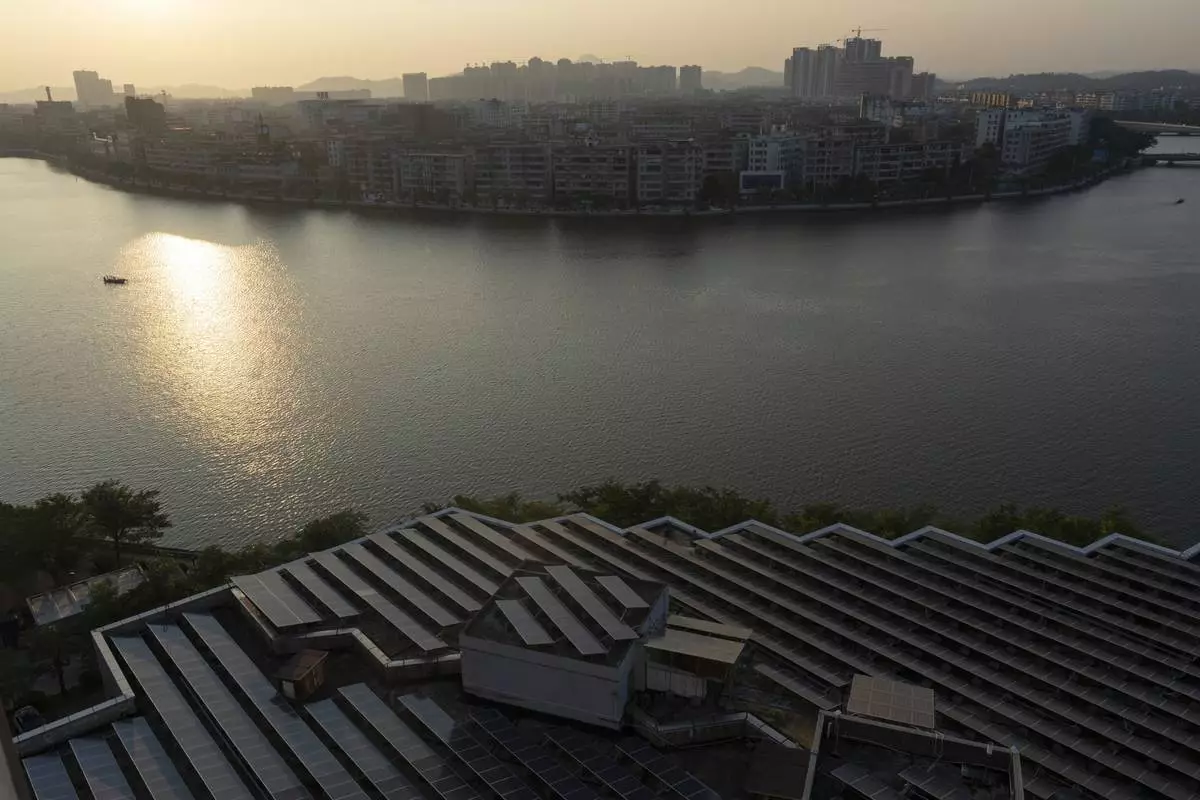
Solar panels on a roof are seen near the sunrise over Jiangmen in southern China's Guangdong province on Friday, Oct. 11, 2024. (AP Photo/Ng Han Guan)
SEOUL, South Korea (AP) — South Korea's President Yoon Suk Yeol defended his martial law decree as an act of governance and denied rebellion charges, vowing Thursday to “fight to the end” in the face of attempts to impeach him and intensifying investigations into last week’s dramatic move.
He spoke hours before the main opposition Democratic Party submits a new impeachment motion against him for a floor vote this weekend. Parliament on Thursday afternoon passed motions to impeach national police chief Cho Ji Ho and Justice Minister Park Sung Jae, suspending them from official duties, over their enforcement of martial law.
Yoon’s Dec. 3 martial law declaration has generated political chaos and large protests calling for his ouster. The decree brought hundreds of armed troops attempting to encircle parliament and raid the election commission, though no major violence or injuries occurred. Martial law lasted only six hours as Yoon was forced to lift it after the National Assembly unanimously voted it down.
Yoon, a conservative, said he enacted martial law as a warning to the liberal Democratic Party, which controls parliament. He called the party “a monster” and “anti-state forces” that he said tried to use its legislative muscle to impeach top officials, undermined the government’s budget bill for next year and sympathized with North Korea.
“I will fight to the end to prevent the forces and criminal groups that have been responsible for paralyzing the country’s government and disrupting the nation’s constitutional order from threatening the future of the Republic of Korea,” Yoon said.
“The opposition is now doing a sword dance of chaos, claiming that the declaration of martial law constitutes to an act of rebellion. But was it really?” he said.
Yoon said martial law was an act of governance that cannot be the subject of investigations and doesn’t amount to rebellion. He said the deployment of nearly 300 soldiers to the National Assembly was designed to maintain order, not dissolve or paralyze it.
The Democratic Party quickly dismissed Yoon’s statement as “an expression of extreme delusion” and “a declaration of war against the people.” Kim Min-seok, head of a party task force, accused the president of attempting to incite pro-Yoon riots by far-right forces. He said the Democratic Party will focus on getting the motion impeaching Yoon passed on Saturday.
It's unclear how Yoon's comments will affect his fate. Opposition parties hold 192 seats combined, eight votes short of a two-thirds majority of the 300 members of the National Assembly. The earlier attempt to impeach Yoon failed with most lawmakers from Yoon’s governing People Power Party boycotting the vote.
Yoon's speech was expected to deepen a divide inside the PPP. When party chair Han Dong-hun, a critic of Yoon, called Yoon's statement “a confession of rebellion” during a party meeting, Yoon loyalists angrily jeered and called on Han to stop speaking. Han has urged party members to vote in favor of Yoon's impeachment.
Opposition parties and even some PPP members say the martial law decree was unconstitutional. South Korean law allows the president to declare martial law during wartime or similar emergencies, and they said such a situation did not exist. They argue that deploying troops to seal the National Assembly to suspend its political activities amounted to rebellion because the constitution doesn’t give a president such rights in any situation.
The country's law enforcement authorities are investigating whether Yoon and others involved in imposing martial law committed rebellion, abuse of power and other crimes. A conviction for rebellion carries a maximum penalty of death.
The National Assembly on Thursday passed a bill that could introduce an independent counsel to investigate Yoon on rebellion charges without his approval. A bill it endorsed earlier this week on appointing an independent counsel requires Yoon's approval. The Justice Ministry on Monday placed an oversea travel ban on Yoon.
South Korean law gives a president immunity from prosecution while in office, except for allegations of rebellion or treason. This means that Yoon can be questioned and detained by investigative agencies over his martial law decree, but many observers doubt that authorities will forcefully detain him because of the potential for clashes with his presidential security service.
On Wednesday, Yoon’s presidential security service didn't allow police to search the presidential office.
Yoon's statement was seen as an about-face. Last Saturday, he apologized over declaring martial law and said he wouldn't avoid responsibility for it. He said he would leave it to his party to chart a course through the political turmoil, “including matters related to my term in office.”
On Wednesday, Yoon's former defense minister, Kim Yong Hyun, was arrested on allegations of playing a key role in a rebellion and committing abuse of power. The national police chief, Cho, and the head of Seoul's metropolitan police have been detained while their actions of sending police forces to the National Assembly are investigated as a criminal matter.
Park, the impeached justice minister, has faced suspicions raised by the opposition that he was involved in the planning and execution of Yoon’s martial law decree. Park has denied the accusations.
Kim, who resigned after martial law was lifted, is one of Yoon’s close associates. He has been accused of recommending martial law to Yoon and sending troops to the National Assembly to block lawmakers from voting on it. He tried to kill himself in detention, but correctional officers stopped him and he was in stable condition, according to the Justice Ministry.
In his speech Thursday, Yoon said he had discussed imposing martial law only with Kim before he informed other top officials about it at a Cabinet meeting just before its declaration.
On the night of Dec. 3, besides the National Assembly, Yoon and Kim sent troops to the National Election Commission. That raised speculation that he might have tried to seize computer servers at the commission as he believed unfounded rumors that the results of April's parliamentary elections, in which his party suffered steep losses, were rigged.
Yoon said he asked Kim to examine the supposed vulnerabilities of the commission's computer systems, which Yoon said was hampering the credibility of election results. He accused the commission of resisting a thorough inspection by Seoul’s spy agency following a cyberattack attributed to North Korea-backed hackers last year.
If Yoon is impeached, his presidential powers would be suspended until the Constitutional Court decides whether to remove him from office or restore his powers. If he is dismissed, a new presidential election would be required within 60 days.
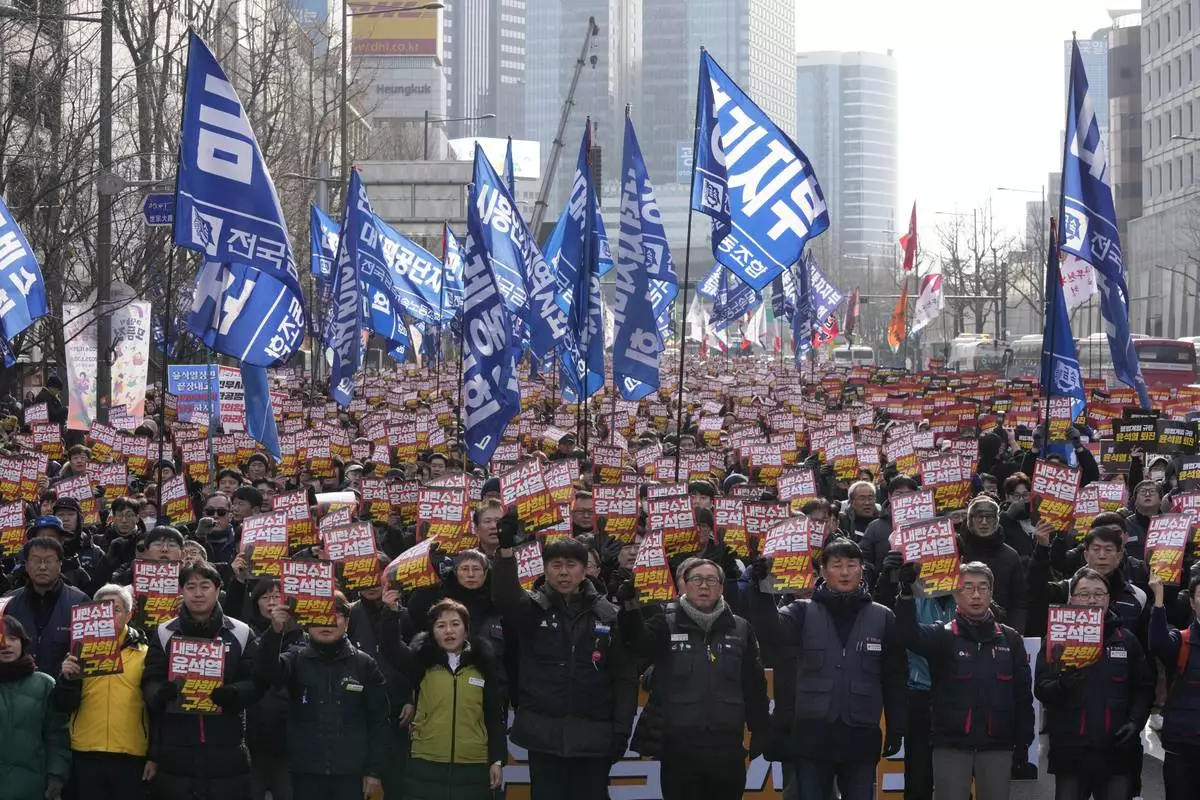
Protesters stage a rally to demand South Korean President Yoon Suk Yeol's impeachment in Seoul, South Korea, Thursday, Dec. 12, 2024. The signs read "Arrest the rebellion leader Yoon Suk Yeol." (AP Photo/Ahn Young-joon)
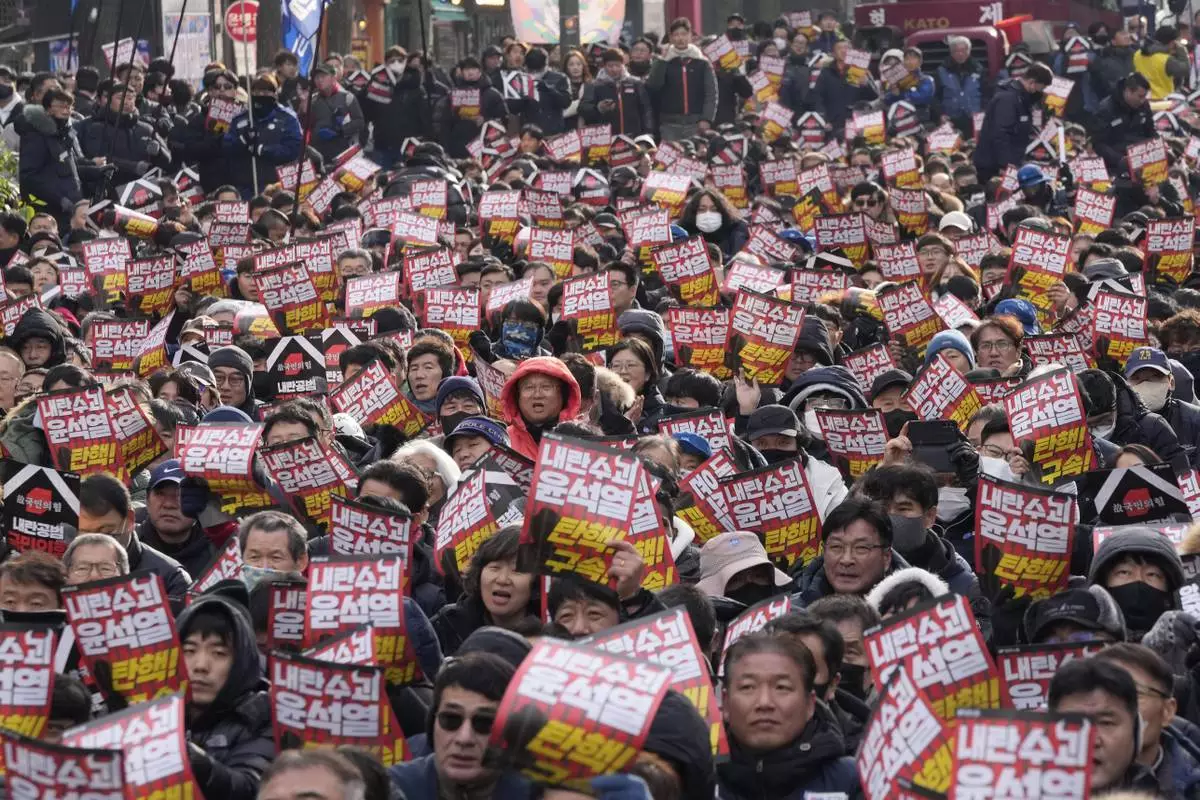
Protesters stage a rally to demand South Korean President Yoon Suk Yeol's impeachment in Seoul, South Korea, Thursday, Dec. 12, 2024. The signs read "Arrest the rebellion leader Yoon Suk Yeol." (AP Photo/Ahn Young-joon)
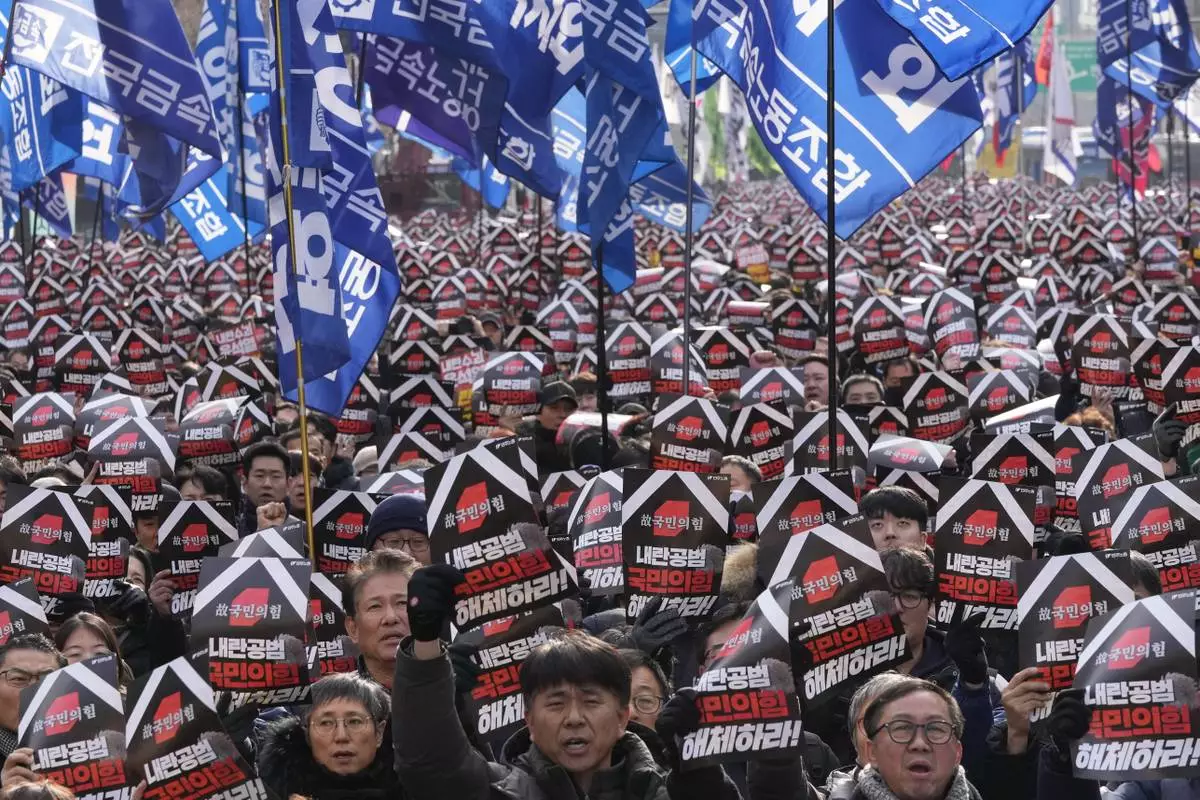
Protesters stage a rally to demand South Korean President Yoon Suk Yeol's impeachment in Seoul, South Korea, Thursday, Dec. 12, 2024. The signs read "Disband the ruling People Power Party." (AP Photo/Ahn Young-joon)
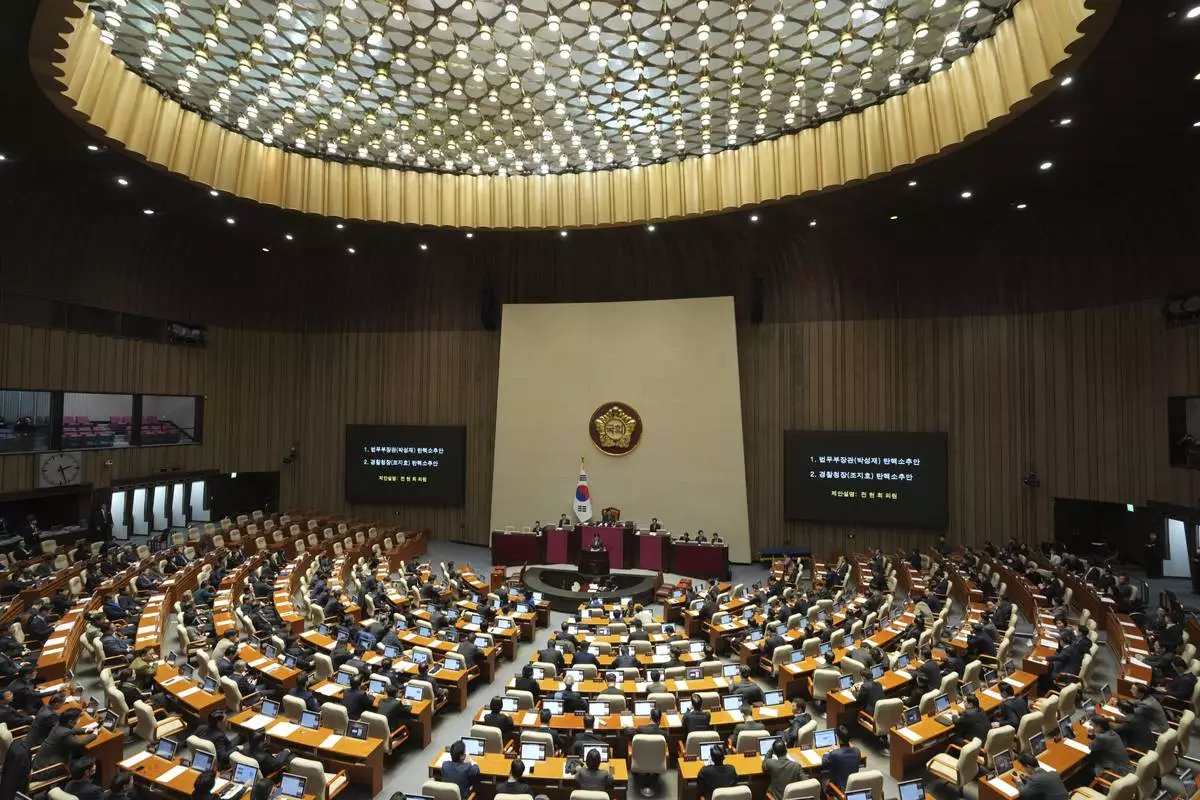
Lawmakers attend a plenary session held relating to the martial law declaration, at the National Assembly in Seoul, South Korea, Thursday, Dec. 12, 2024. (AP Photo/Lee Jin-man)
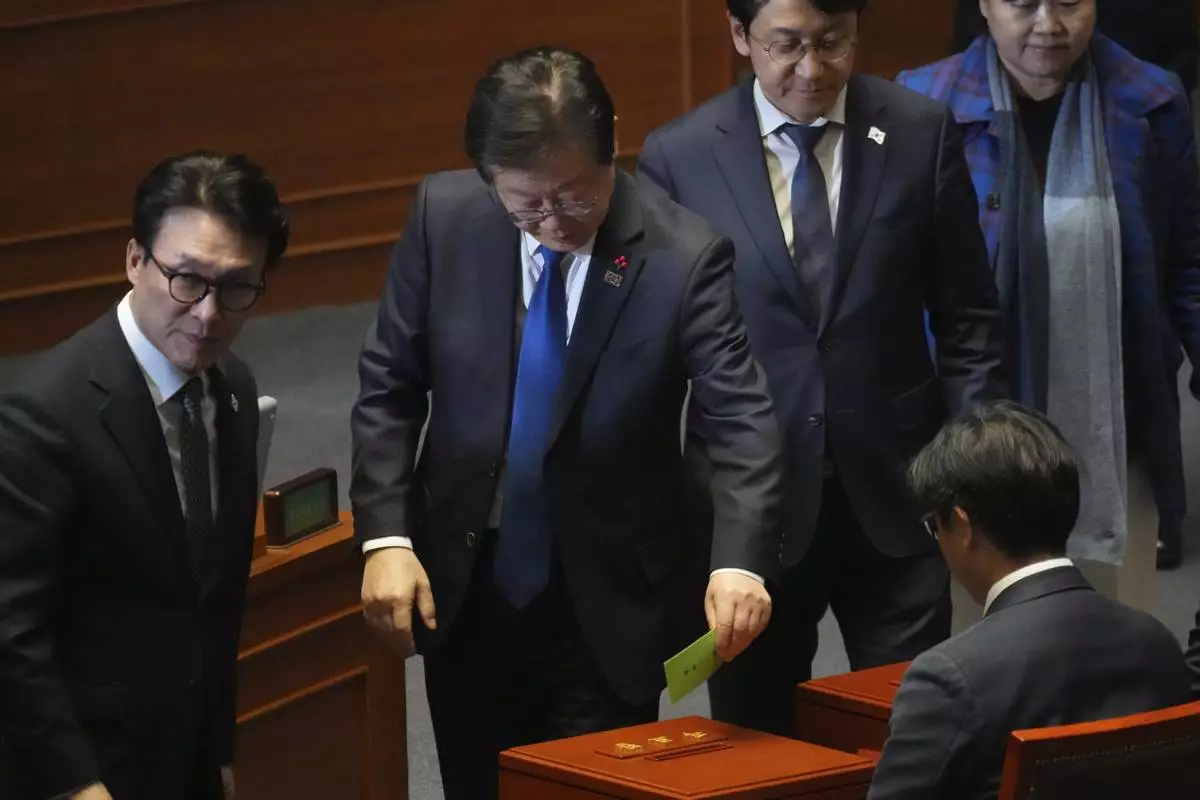
South Korea's main opposition Democratic Party leader Lee Jae-myung, center, casts a ballot on impeachment bills for the national Police Chief Cho Ji Ho and Justice Minister Park Sung Jae during a plenary session held relating to the martial law declaration, at the National Assembly in Seoul, South Korea, Thursday, Dec. 12, 2024. (AP Photo/Lee Jin-man)
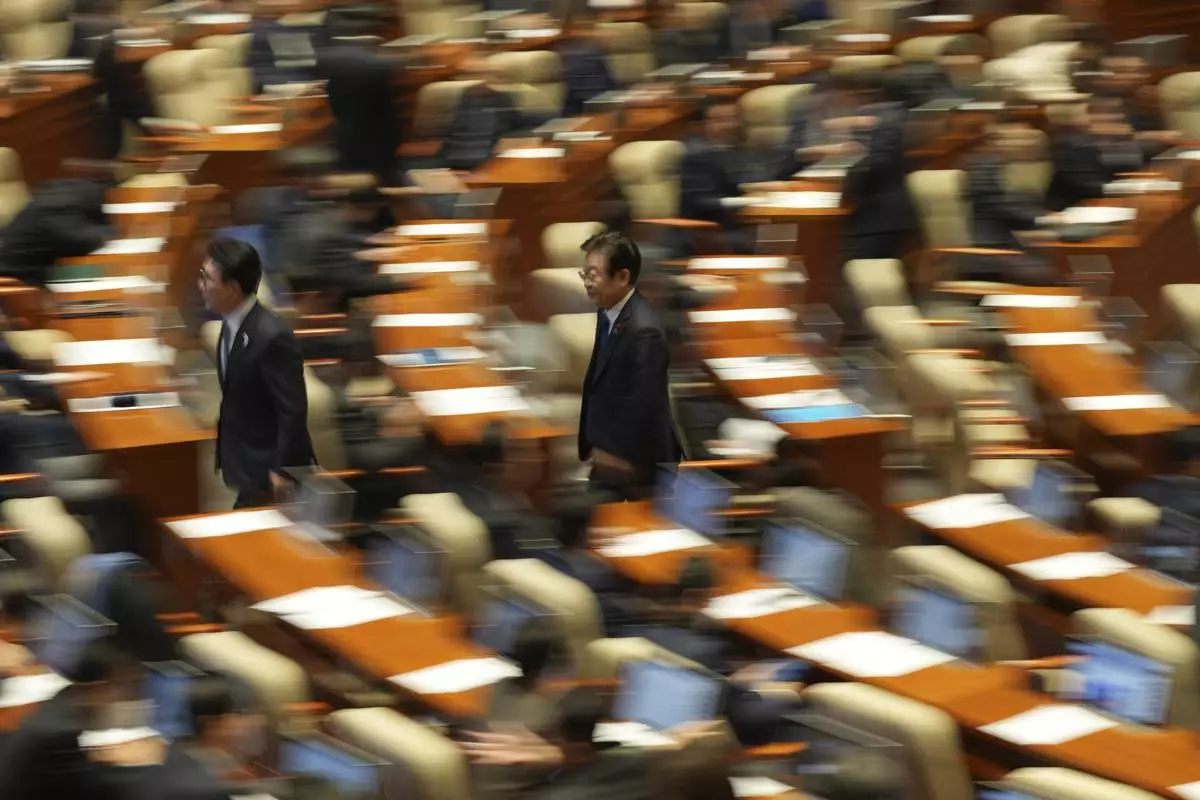
South Korea's main opposition Democratic Party leader Lee Jae-myung, center, walks back to his seat after he voted on an impeachment bills for the national police chief Cho Ji Ho and justice minister Park Sung Jae during a plenary session held relating to the martial law declaration, at the National Assembly in Seoul, South Korea, Thursday, Dec. 12, 2024. (AP Photo/Lee Jin-man)
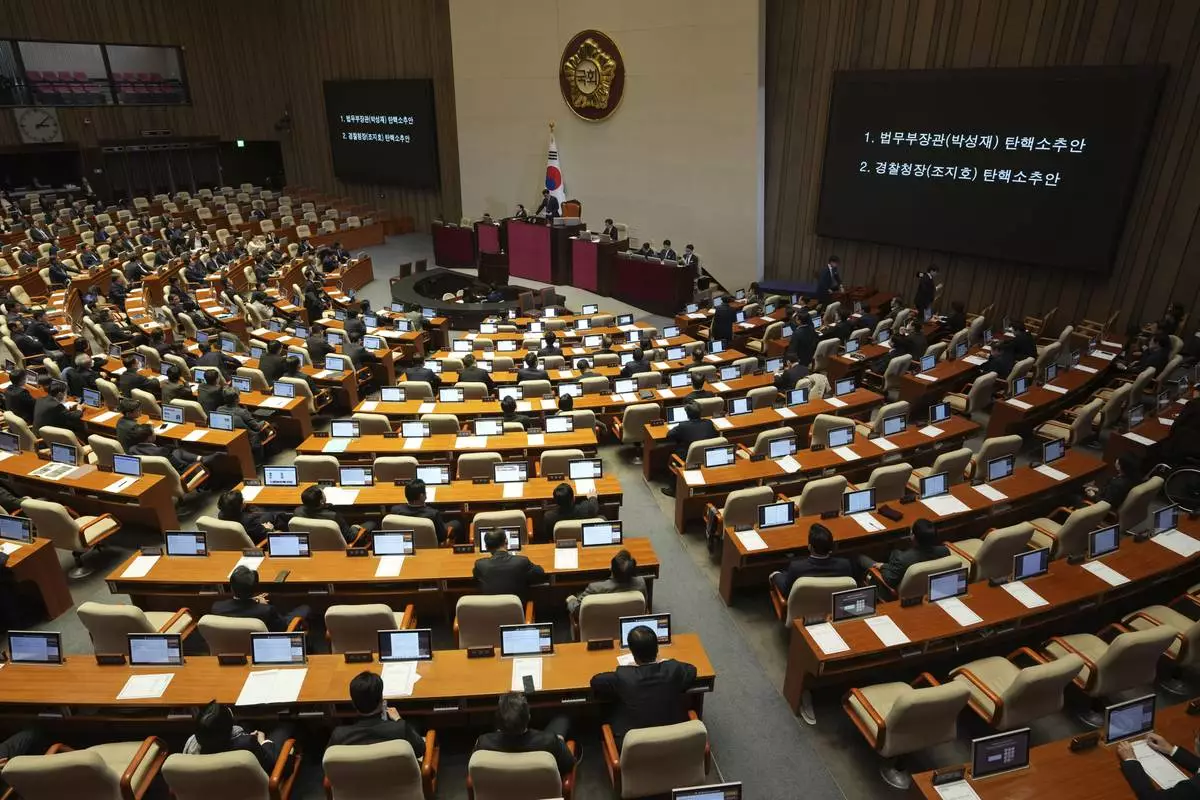
South Korea's National Assembly Speaker Woo Won-shik, center top, speaks during a plenary session held relating to the martial law declaration, at the National Assembly in Seoul, South Korea, Thursday, Dec. 12, 2024. (AP Photo/Lee Jin-man)
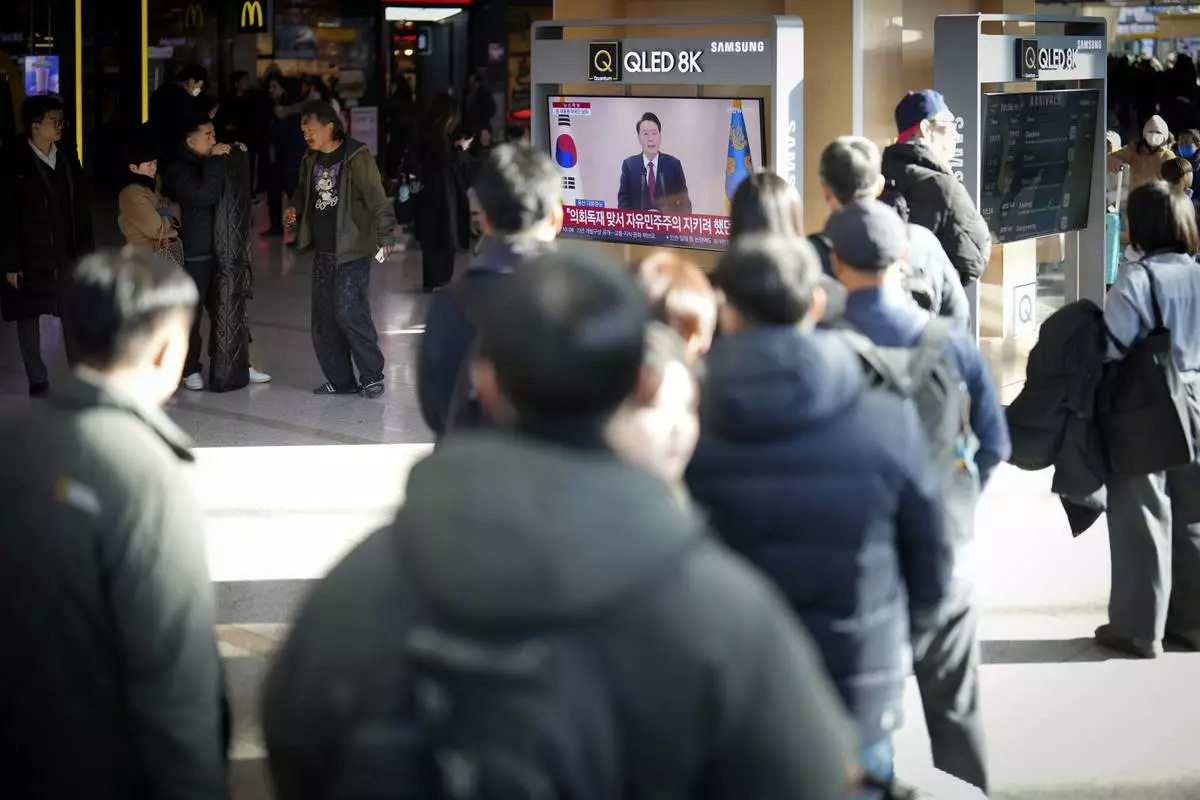
People watch a TV screen showing the live broadcast of South Korean President Yoon Suk Yeol's announcement at the Seoul Railway Station in Seoul, South Korea, Thursday, Dec. 12, 2024. (AP Photo/Lee Jin-man)
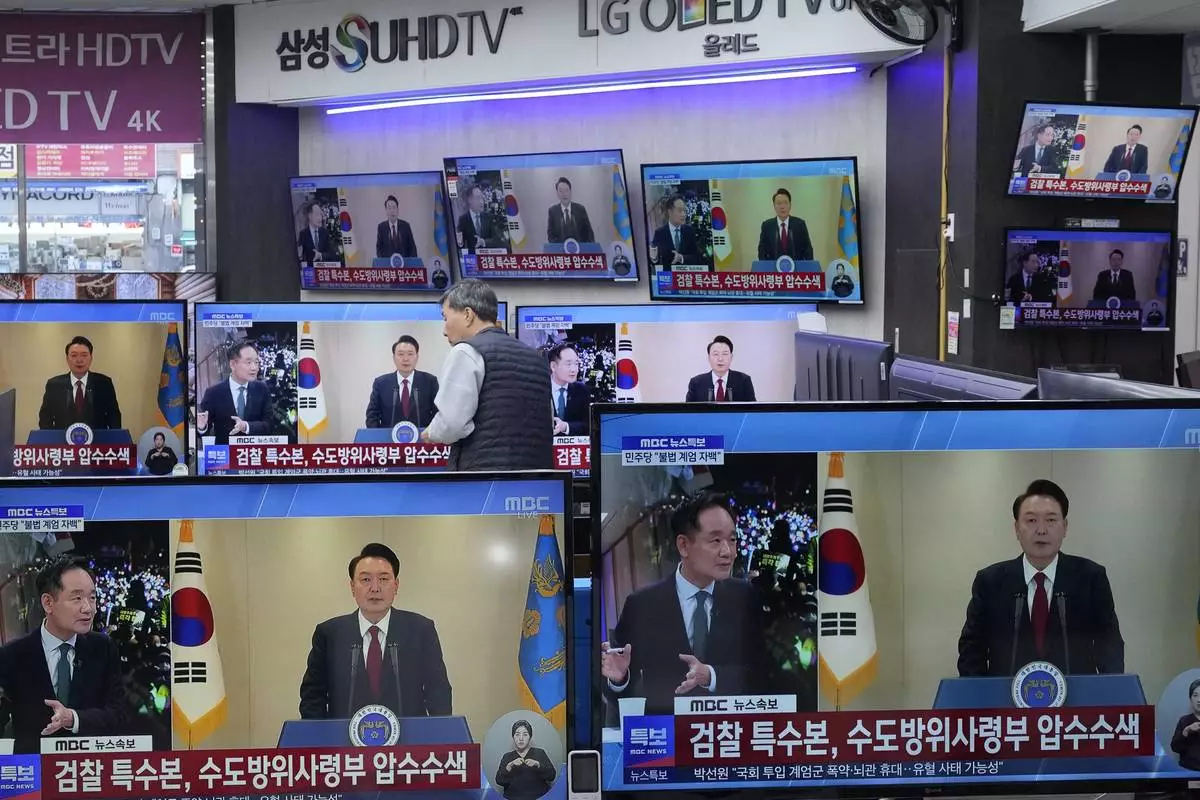
TV screens show the broadcast of South Korean President Yoon Suk Yeol's speech at the Yongsan Electronic store in Seoul, South Korea, Thursday, Dec. 12, 2024. (AP Photo/Ahn Young-joon)
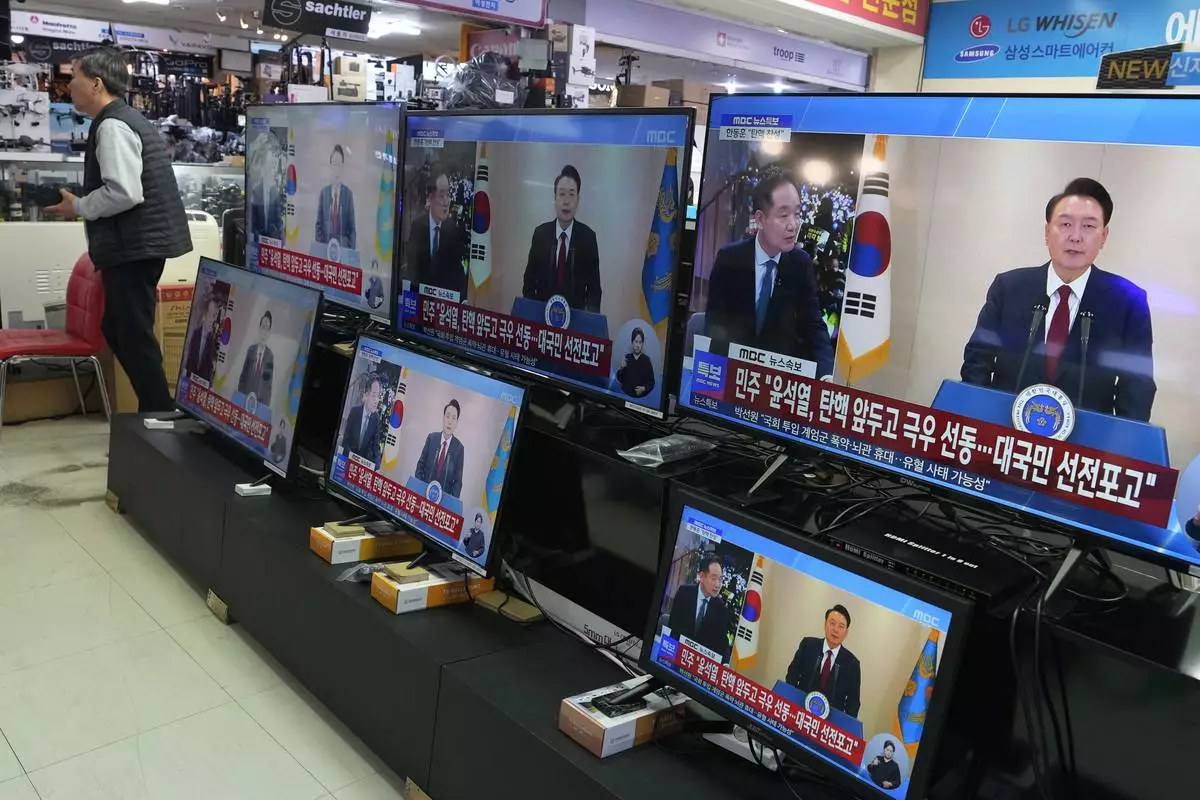
TV screens show the broadcast of South Korean President Yoon Suk Yeol's speech at the Yongsan Electronic store in Seoul, South Korea, Thursday, Dec. 12, 2024. (AP Photo/Ahn Young-joon)
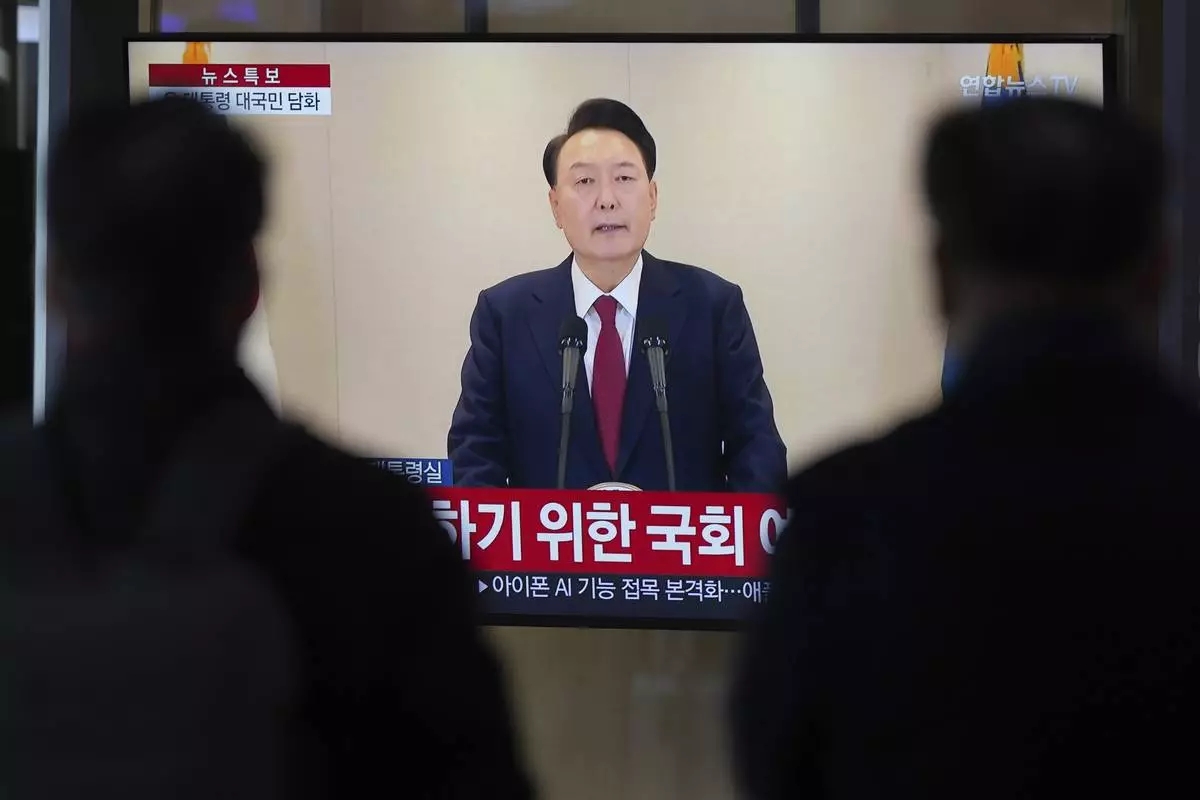
People watch a TV screen showing the live broadcast of South Korean President Yoon Suk Yeol's announcement at the Seoul Railway Station in Seoul, South Korea, Thursday, Dec. 12, 2024. (AP Photo//Lee Jin-man)
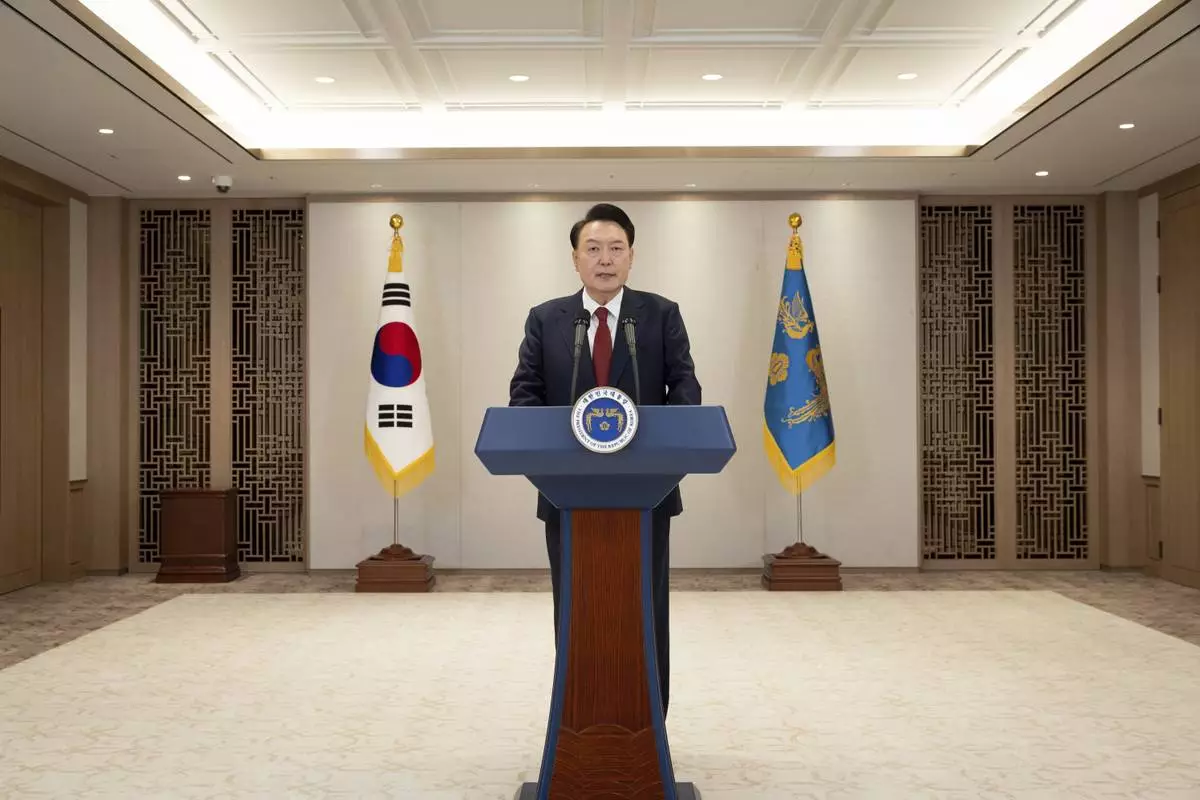
In this photo provided by South Korea Presidential Office, South Korean President Yoon Suk Yeol speaks at the presidential office in Seoul, South Korea, Thursday, Dec. 12, 2024. (South Korea Presidential Office via AP)
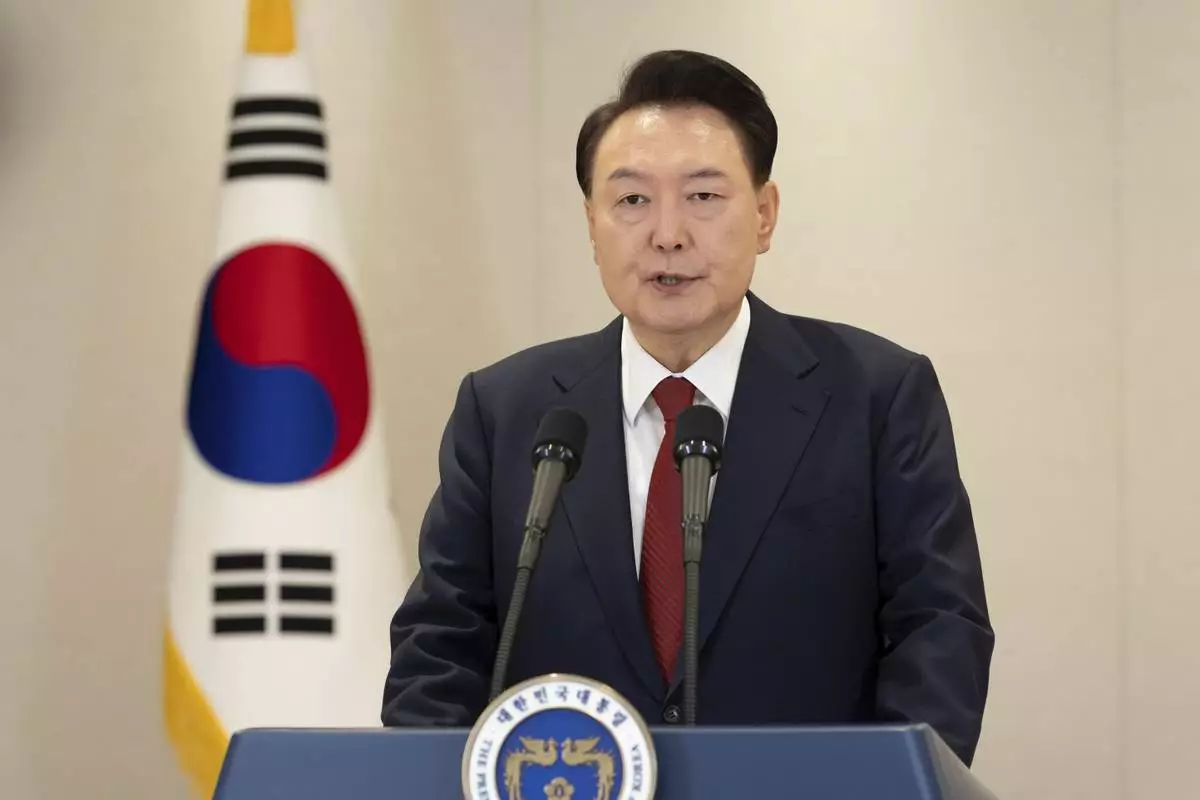
In this photo provided by South Korea Presidential Office, South Korean President Yoon Suk Yeol speaks at the presidential office in Seoul, South Korea, Thursday, Dec. 12, 2024. (South Korea Presidential Office via AP)
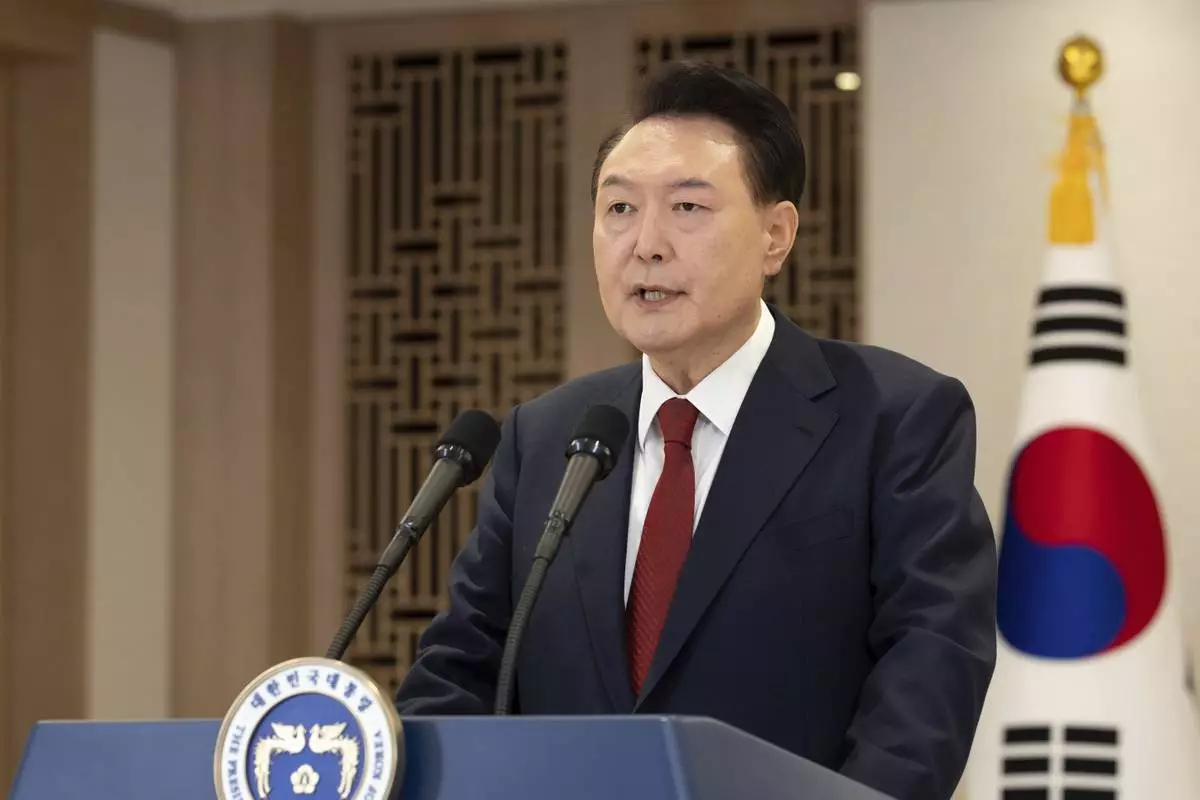
In this photo provided by South Korea Presidential Office, South Korean President Yoon Suk Yeol speaks at the presidential office in Seoul, South Korea, Thursday, Dec. 12, 2024. (South Korea Presidential Office via AP)
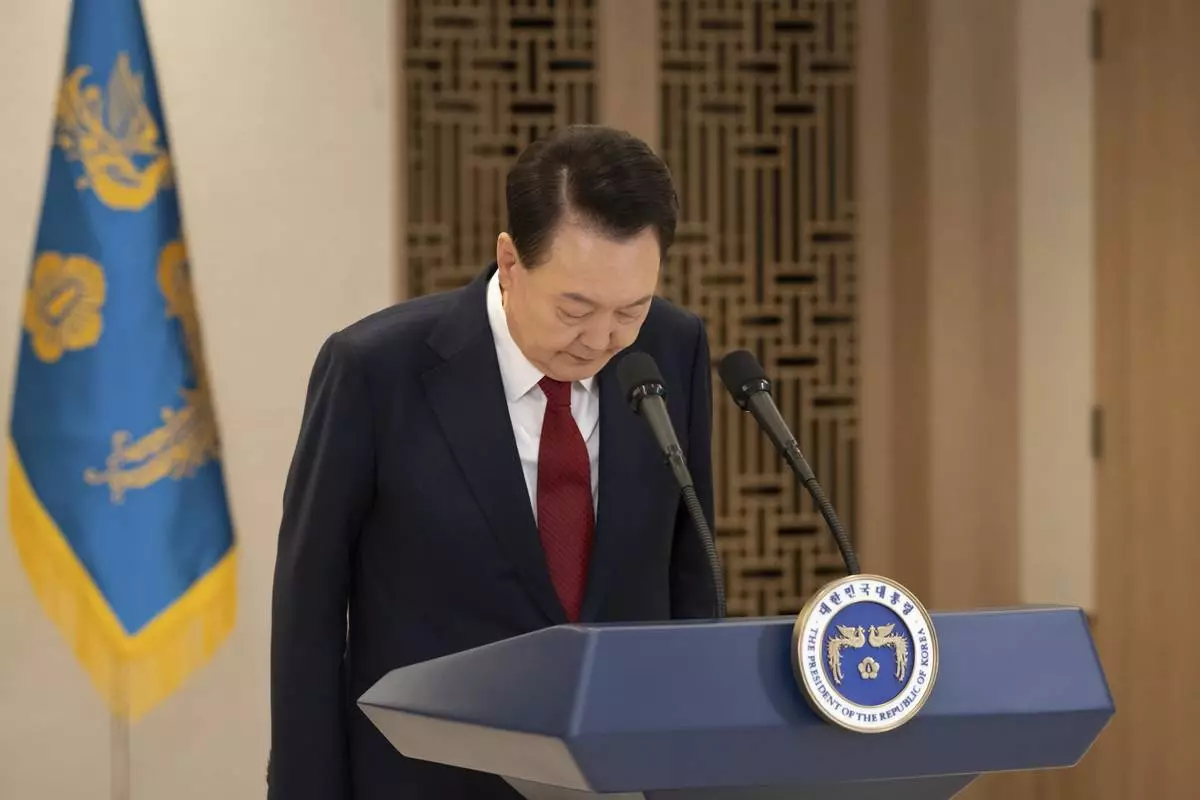
In this photo provided by South Korea Presidential Office, South Korean President Yoon Suk Yeol bows while delivering a speech at the presidential office in Seoul, South Korea, Thursday, Dec. 12, 2024. (South Korea Presidential Office via AP)
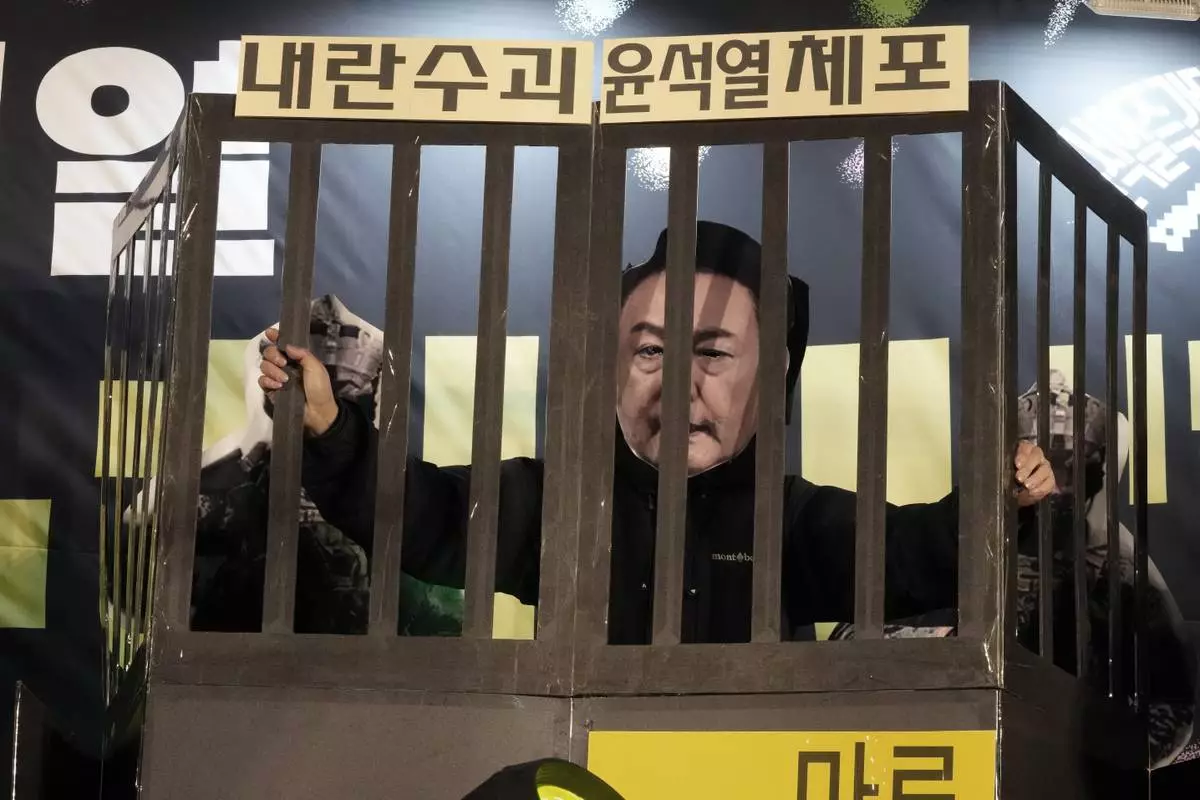
A participant wearing a mask of South Korean President Yoon Suk Yeol performs during a rally to demand his impeachment outside the National Assembly in Seoul, South Korea, Wednesday, Dec. 11, 2024. The signs read "Arrest the rebellion leader Yoon Suk Yeol." (AP Photo/Ahn Young-joon)
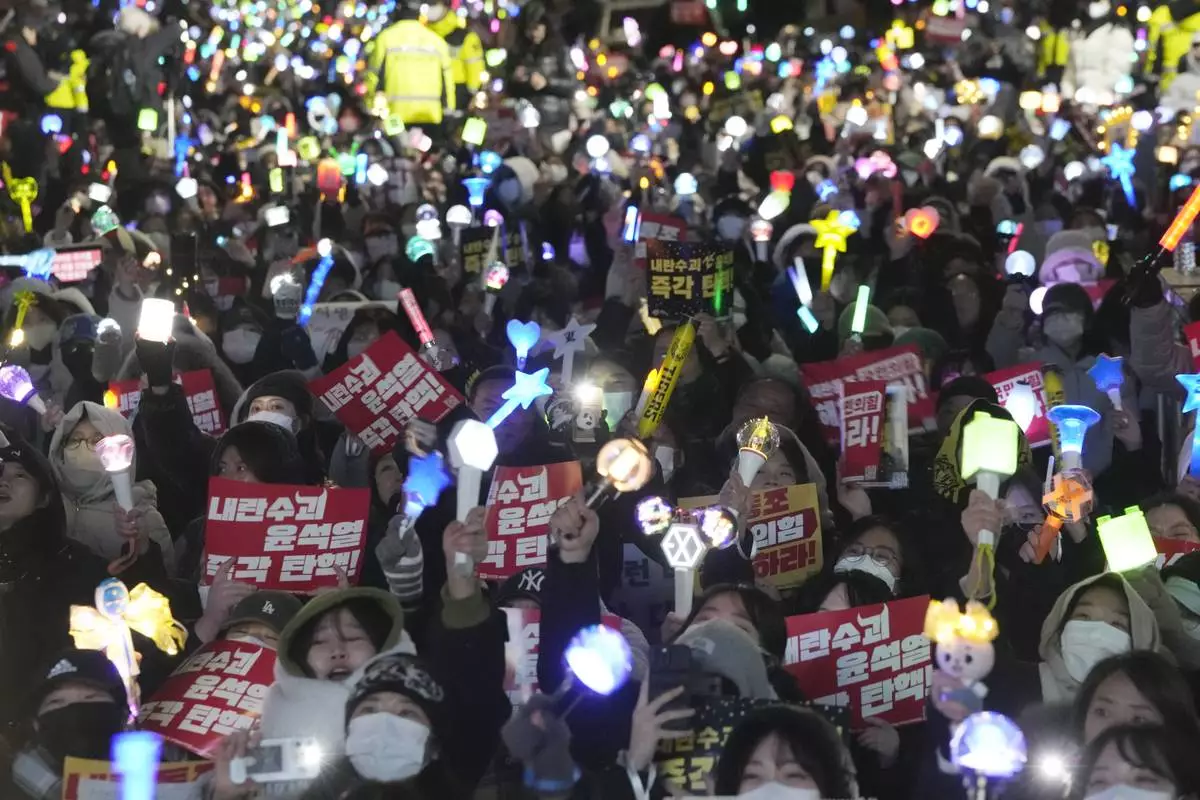
Participants stage a rally to demand South Korean President Yoon Suk Yeol's impeachment, outside the National Assembly in Seoul, South Korea, Wednesday, Dec. 11, 2024. (AP Photo/Ahnn Young-joon)
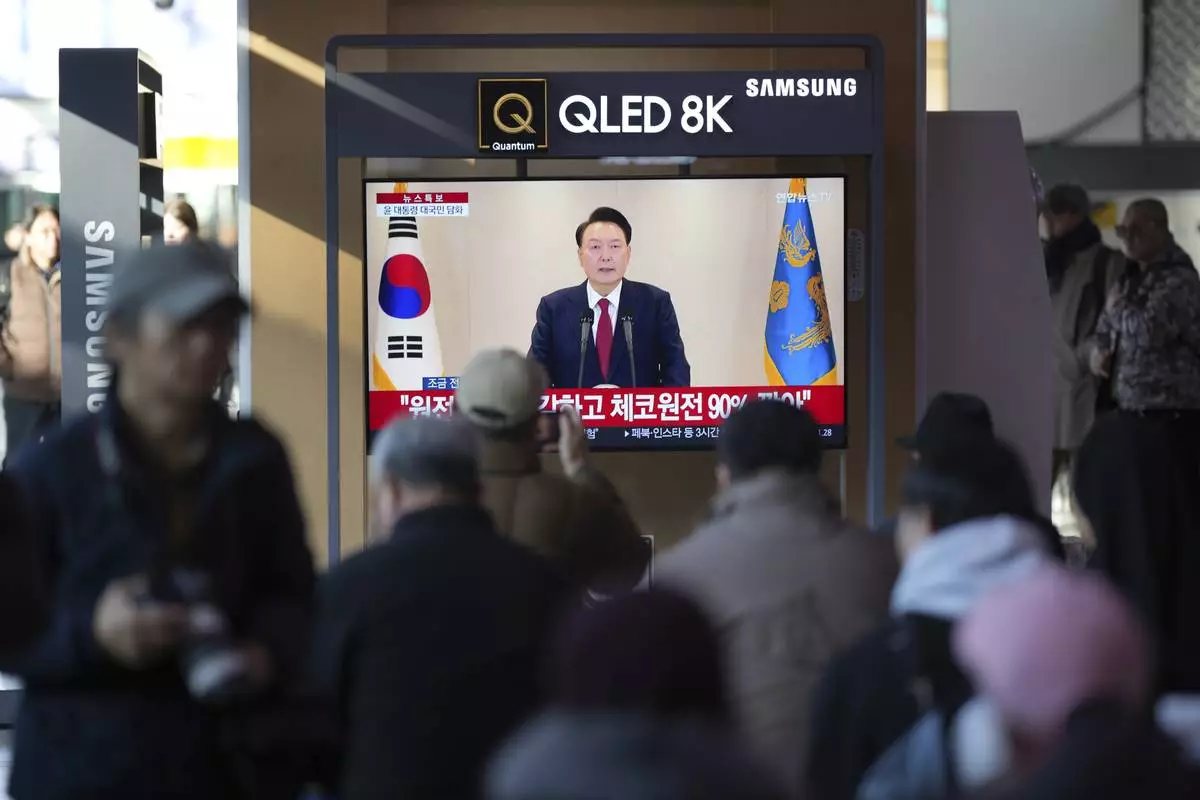
People watch a TV screen showing the live broadcast of South Korean President Yoon Suk Yeol's announcement at the Seoul Railway Station in Seoul, South Korea, Thursday, Dec. 12, 2024. (AP Photo//Lee Jin-man)
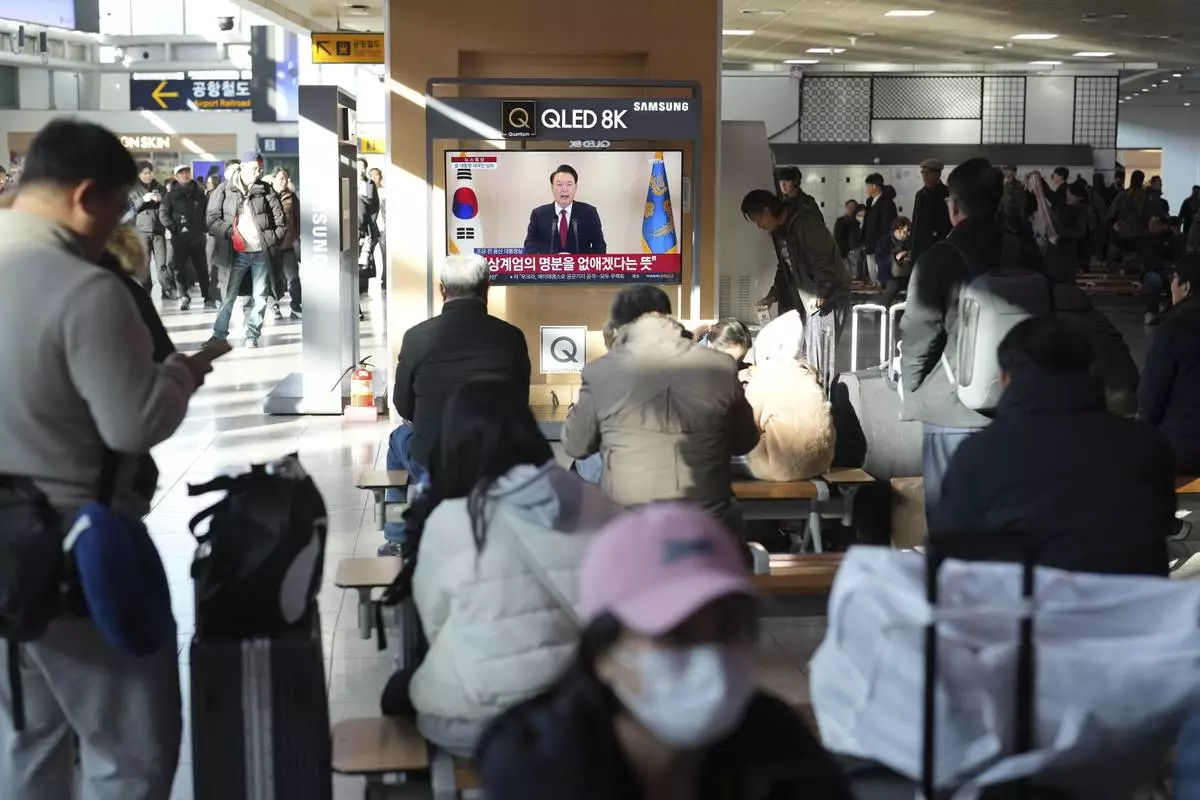
People watch a TV screen showing the live broadcast of South Korean President Yoon Suk Yeol's announcement at the Seoul Railway Station in Seoul, South Korea, Thursday, Dec. 12, 2024. (AP Photo/Lee Jin-man)
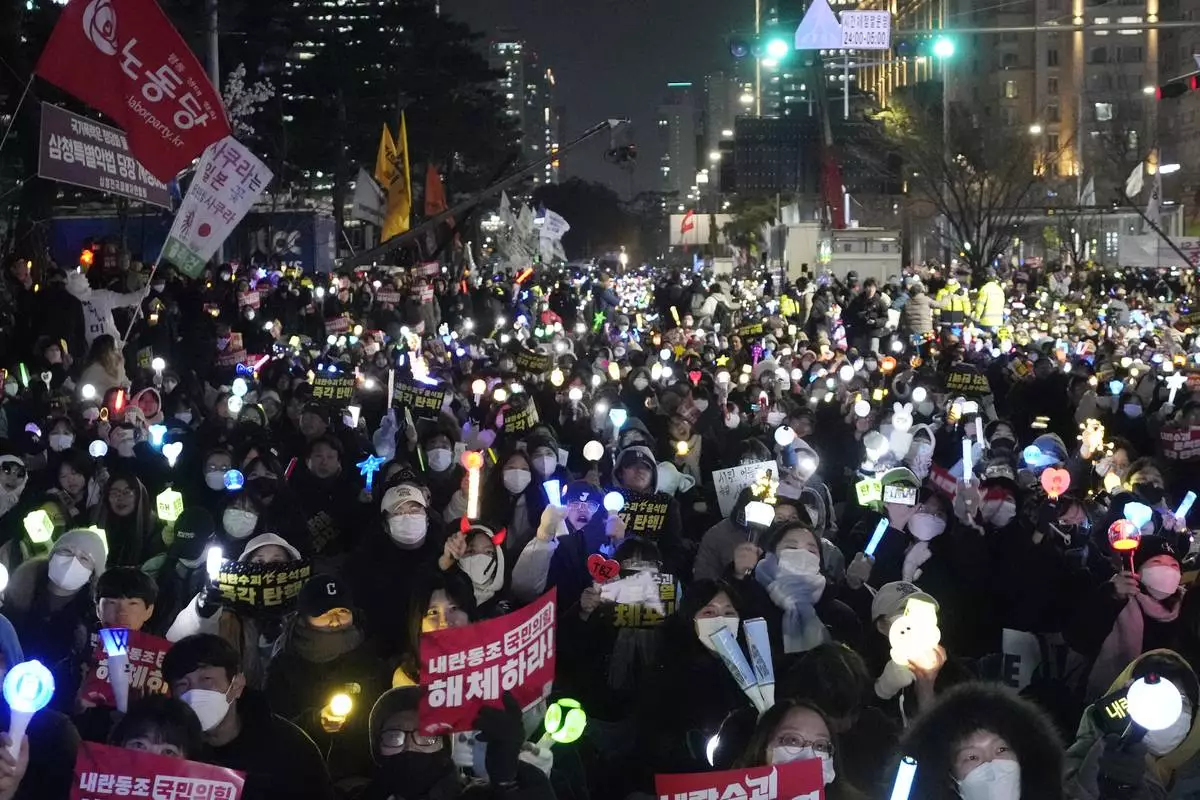
Participants stage a rally to demand South Korean President Yoon Suk Yeol's impeachment, outside the National Assembly in Seoul, South Korea, Wednesday, Dec. 11, 2024. (AP Photo/Ahnn Young-joon)
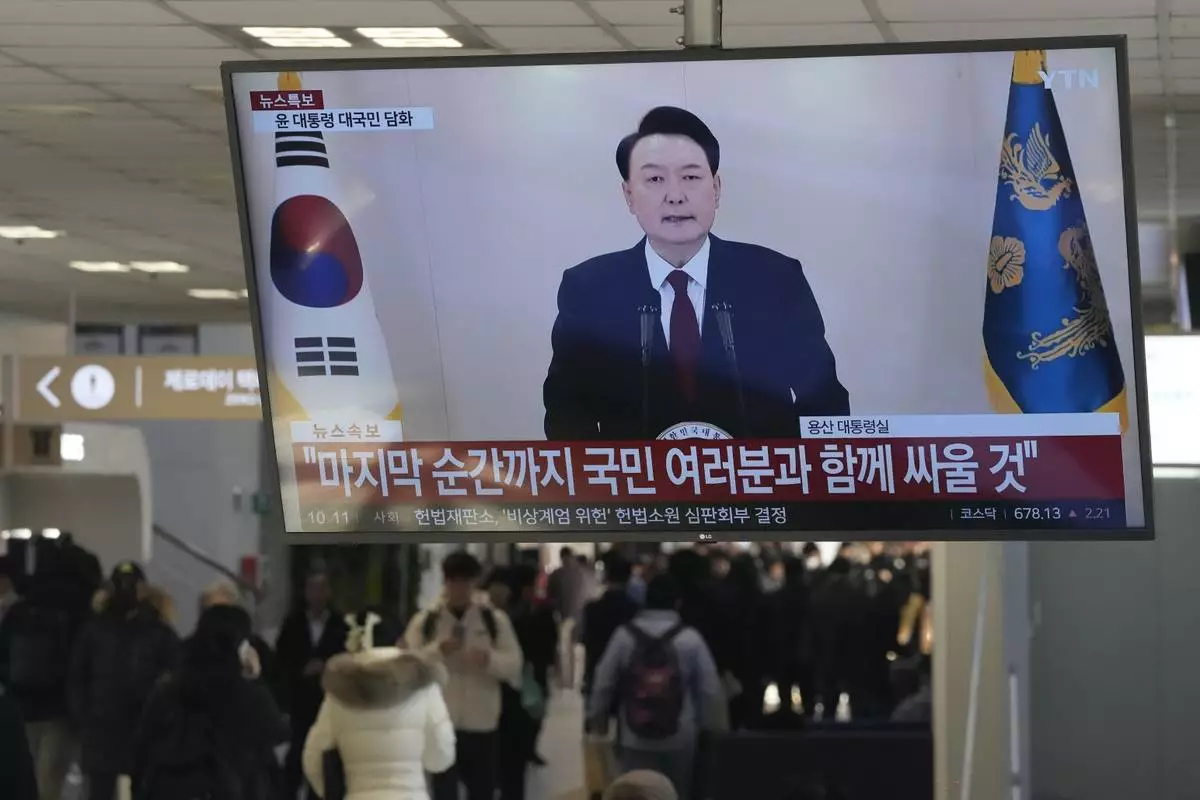
A TV screen shows South Korean President Yoon Suk Yeol's televised briefing at a bus terminal in Seoul, South Korea, Thursday, Dec. 12, 2024. (AP Photo/Ahn Young-joon)
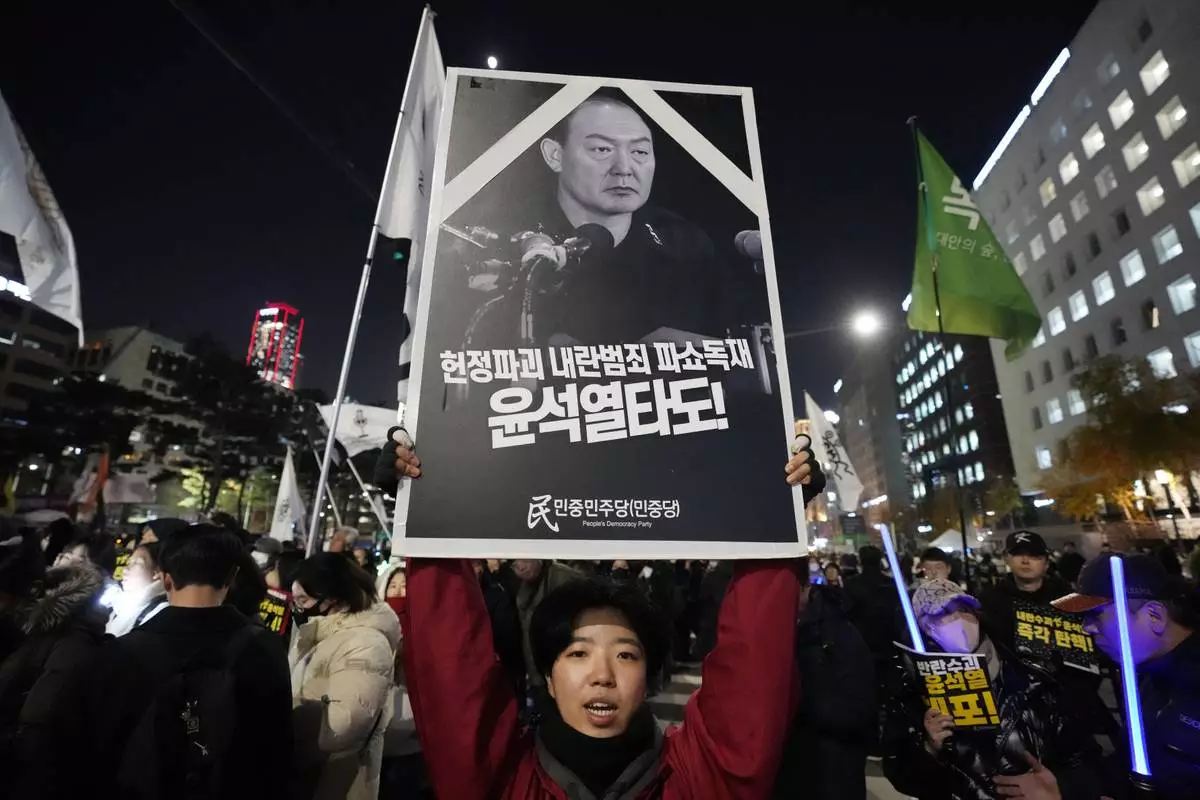
A participant holds up a banner with writing reading "Overthrow the rebellion criminal Yoon Suk Yeol", during a rally to demand South Korean President Yoon Suk Yeol's impeachment, outside the National Assembly in Seoul, South Korea, Wednesday, Dec. 11, 2024. (AP Photo/Ahn Young-joon)
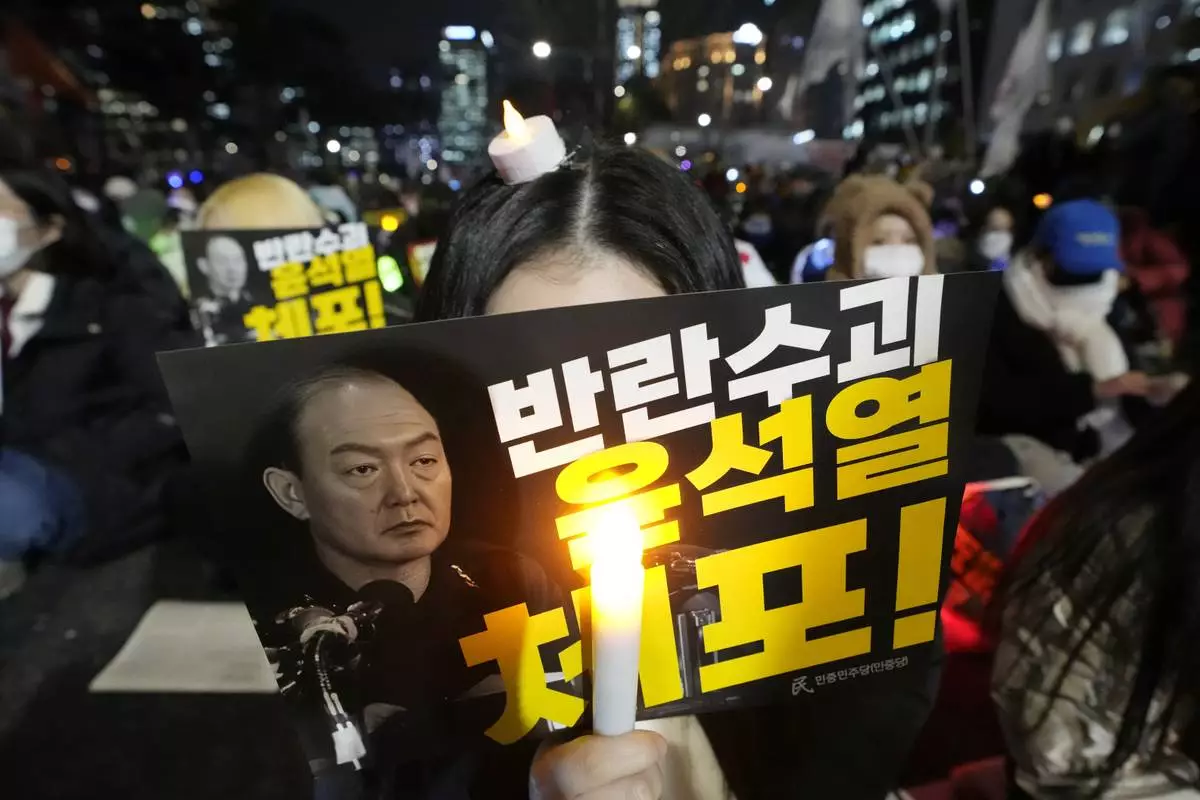
A participant holds a banner with writing reading "Arrest the rebellion leader Yoon Suk Yeol", during a rally to demand South Korean President Yoon Suk Yeol's impeachment outside the National Assembly in Seoul, South Korea, Wednesday, Dec. 11, 2024. (AP Photo/Ahn Young-joon)






